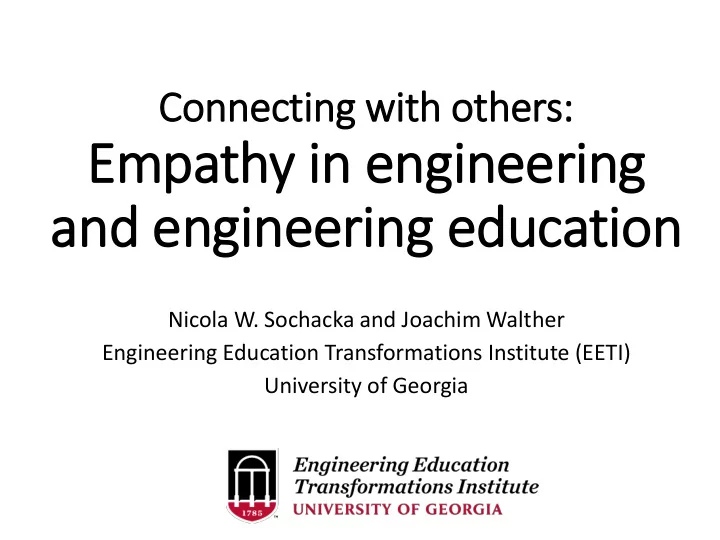

Connecting with others: Empathy in engineering and engineering education Nicola W. Sochacka and Joachim Walther Engineering Education Transformations Institute (EETI) University of Georgia
Overview 1. Why? What? • Why empathy in engineering? • What is empathy & can we learn it? 2. Let’s try it - Empathy module 3. Now what? Empathy and engineering formation.
New Study Reveals Engineering Schools Fail To Teach Empathy Jon Marcus , PTC With its relentless emphasis on technical problem-solving, engineering education may be overlooking something equally important according to a new study. .. https://www.forbes.com/sites/ptc/2013/12/16/new-study-reveals- engineering-schools-fail-to-teach-empathy/#5ba88ec0482f Cech, E. (2014). Culture of disengagement in engineering education? Science, Technology, & Human Values, 39 (1), 42-72. doi:10.18260/p.2435510.1177/0162243913504305
“The behaviors that create psychological safety – conversational turn- taking and empathy – are part of the same unwritten rules we often turn to… when we need to establish a bond. And those human bonds matter as much at work as anywhere else. In fact, they sometimes matter more.” Duhigg, C. (2016). What google learned from its quest to build the perfect team. The New York Times Magazine . https://www.nytimes.com/2016/02/28/magazine/what-google-learned-from-its-quest-to-build-the-perfect-team.html?_r=0
In which other aspects of engineering might empathy be relevant?
Can empathy be taught?
What is empathy? Who am I? What will I do in a given situation? What can I do / what do I learn? Walther, J., Miller, S. E., & Sochacka, N. W. (2017). A model of empathy in engineering as a core skill, practice orientation, and professional way of being. Journal of Engineering Education, 106 (1), 123-148.
‘Teaching’ empathy in a core mechanical engineering design course Context: Interdisciplinary module development with engineering and social work Engineering and Society Course: • Open ended projects - Systems understanding and problem framing • Critical readings and discussions • Reflection exercises Module 1: Module 2: Module 3: Module 4: Self Affective Affective Mode awareness sharing responding switching Data: • Observations • Post-module reflection • Final reflection • Design artefacts
The design of the modules Intro to empathy Skills facet exercises Debrief Application scenario: Roleplay • 75 mins each Debrief & • Engineering and society course reflection • Connected to semester project
Let’s give it a try! • Encountering Others (Commonality exercise) • Role play – professional engineering scenario
Focus today: Encountering Others Self-Awareness Intentional use of self
Commonality Exercise Instructions: 1. Talk with two people who you don’t very well and uncover at least two things you have in common with each person (4 mins) . 2. Debrief (5 mins) : a) How did you approach people /what did you do? b) What signals did you pick up from your counterpart? c) How did you feel throughout the exercise?
the self your most powerful tool in interpersonal communication
Role Play
Application to engineering work – scenario You are an engineer working PG&E. You have been tasked to connect with a range of stakeholders around the power shutdowns. You are attending a range of community events. Today you are speaking to people at the Saturday morning farmers’ market . Your goal is to make connections with stakeholders and start conversations that could potentially lead to some local residents serving on an advisory committee.
Your task… • The engineer approaches community members (2) at the street festival to meet and establish a relationship with them (2 min) • After the first round, select a new engineer, and repeat the role play (try to approach the conversation differently than the prior round(s)) • Total 5 minutes Focus on: Awareness of self, Intentional use of body language, Awareness and regulation of own emotional reaction, & Focus on and interest in other person
what was it like? To be the engineer? What did the residents say to you? What did you say/do in response? To be the resident? What did you say to the engineer? What did they do? How did you feel?
Empathy & Engineering Formation Variations in Self-Other relationships: Disciplinary values and narratives: Dispassionate Problem- Engineering neutrality solving Expertise Factual Technology objectivity focus Walther, J., Brewer, M., Sochacka, N. W. & Miller, S. E. (2020). Empathy and Engineering Formation. Journal of Engineering Education, January edition.
“One doesn’t have to operate with great malice to do great harm. The absence of empathy and understanding are sufficient .” ― Charles M. Blow
Now what? Discussion: • What are places in the curriculum where empathy could be integrated? • What can we do about disciplinary values and narratives that may be problematic in helping students develop empathy?
Thank You! Shari Miller Jo Walther Nicki Sochacka School of Social Work College of Engineering College of Engineering semiller@uga.edu jwalther@engr.uga.edu sochacka@uga.edu This material is based on work supported by the National Science Foundation under grant 1463829. Any opinions, findings, and conclusions or recommendations expressed in this material are those of the authors and do not necessarily reflect the views of the National Science Foundation.
Recommend
More recommend